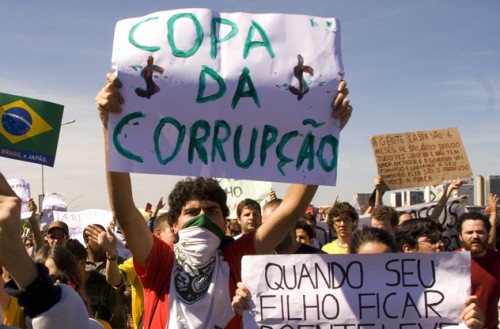Image: World Cup protest, Brazil (Photo: Felipe Canova).
Everyone associates Brazil with football and the World Cup. Brazilians pouring out onto the street last summer to protest the competition being hosted in their country was last thing many of us expected to see.
In over one hundred cities, over one million people rallied by social media came together to tell the world about the high cost of soon-to-be superfluous stadiums, police brutality and corruption in all its forms that the competition had spawned. Fans held signs high that said ‘FIFA go home’ and ‘The World Cup of Corruption’.
Around US$15 billion was spent on Brazil’s World Cup, but only 10% of what was promised for schools and healthcare seems to have reached its destination. It was a dispiriting business, particularly for the development community which had been working for years to battle corruption in Brazil with – apparently – little to show for it.
Here in the UK, the Department for International Development (DFID) has commissioned not one, but two evidence papers in the last three years on corruption and anti-corruption, the most recent published earlier this year. Both have told a very similar story: with a few notable exceptions, there is little evidence that anti-corruption approaches work. The clear message to come out of the research is – we need to think about and do anti-corruption programming differently. But we don’t really know what this means yet.
Yet although we can look around and see lots of examples where we seem to be losing the fight against corruption, I’d argue that there are also plenty of reasons to be optimistic (see clip below). Let’s go back to Brazil, where people went onto the streets to make it clear that they had had enough and were not going to be placated. Even by football.
This in itself was, as the football pundits might put it, a result.
Even twenty years ago such protests would have been unthinkable, but decades of anti-corruption reforms do seem to be bearing fruit at last. Transparency International notes some of these: better anti-corruption and transparency legislation; increasing evidence of judicial independence, meaning the corrupt are no longer ‘guaranteed’ impunity; an increased number of investigations and arrests for corruption; an impressively free media; and an increasingly active civil society. Though there is still clearly much to be done, these are impressive achievements that are leading to transformational change.
So what does this tell us? I’d like to pull out two take-away messages.
The ways we try to measure anti-corruption success or failure are deeply flawed: All of these different reforms – and many others – are responsible for the changing landscape in Brazil. It would be impossible to trace this back to one single project, one single anti-corruption programme, one single donor. Any results are likely to come out of a patchwork of reforms, some of which may take years to bear fruit, or may only erupt as the result of a particular scandal, an election, or another such ‘critical juncture’. This is why the results-based agenda in development cooperation is so problematic for fighting corruption. Simply put, even the most ambitious anti-corruption programmes are likely to have only incremental impacts at best, over long periods of time. We need to design anti-corruption programmes differently taking this into account, and we need to find alternative ways to think about measuring ’success’.
Indirect approaches to fighting corruption may be more effective than direct ones: Brazil has not one anti-corruption agency but several different agencies that are responsible for different aspects of corrupt behaviour. There have been a huge number of reforms and initiatives, few of which were designed explicitly to be anti-corruption, all feeding into changing norms and behaviours. Perfect it may not yet be, but things are undeniably changing for the better. The problem is that ‘corruption’ is an emotive word that sums up a huge range of activities and behaviours that work to undermine the public good. But we try to tackle them under one umbrella – anti-corruption. We could aim to improve fiscal transparency, make money laundering much more difficult, improve investigative journalism, improve women’s political participation, improve service providers’ wages (and make sure they get paid on time), reduce police brutality… The list could go on. But we don’t have to call it anti-corruption. It may be harder to communicate simple messages to our publics about what we’re doing to fight corruption, but added together, we are likely to see better results over time. And, at the very least, it’s likely to be easier to measure discrete activities than the giant mass of things that equal ‘corruption’.
To sum up, we know that most direct anti-corruption activities – on their own – are not effective, or at least we don’t have enough evidence of their effectiveness. We know there are no ‘magic bullets’.
But we also know that, despite this, our governments (and perhaps our publics) expect development cooperation to provide technical support for fighting corruption, and they expect it to work even in some of the most difficult environments. And so an ineffective cycle continues.
We need to take this lack of evidence more seriously and think instead about ways to think and work differently, including thinking and working more politically. We need to find ways to push back against approaches to development programming that undermine the likelihood of success. We need to stop asking civil society to deliver quick results against the odds, when many members of civil society literally put their lives on the line to fight corruption. We need to do this to ensure that the next corruption evidence paper DFID commissions – hopefully not in the near future! – has a better story to tell.
Join policymakers, practitioners and researchers to discuss ‘Corruption and development‘ in London on Monday 29 June.










